
Jeffrey Burton Russell. Photo courtesy Associated Press
Jeffrey Burton Russell, professor of history emeritus at the University of California, Santa Barbara (UCSB), died on April 12, 2023, at the age of 88.
In a 1987 article in The Historian, Russell defined his calling: “the purpose of history is to pursue the truth.” He found this pursuit to be realized best in the study of the history of concepts. He accepted the discipline of a meticulous historical methodology, yet also taught his students that research to find meaning in the truths of the past is the purest form of self-examination and reflection. In the preface to The Prince of Darkness (Cornell Univ. Press, 1988), Russell explained that in examining the history of evil, “I have tried throughout to open myself and others to the understanding that knowledge without love, and scholarship without personal involvement and commitment, are dead.”
Russell was devoted to his graduate students, offering seminars that stretched their intellect toward what he called “Truth with a capital T.” He challenged, argued with, and inspired students, all while engaging with them in the same polemic struggle to achieve wisdom. He had a passion for teaching and was generous with his time, kind in spirit, and quick to share himself.
Russell’s career and accomplishments leave an impressive record. He earned his BA in 1955 from the University of California, Berkeley, and his PhD from Emory University in 1960. He taught briefly at the University of New Mexico, then accepted a position at University of California, Riverside (1961–75), where he served as associate dean of the graduate division (1967–75). From 1975 to 1977, he was the Grace Professor of Medieval Studies and director of the Medieval Institute at the University of Notre Dame. He returned to California in 1977 as dean of graduate studies at Sacramento State University. He then became professor of history at UCSB in 1979, where he was instrumental in developing the medieval European history program. Russell retired in 1998 but joked that he viewed it as a permanent sabbatical; he continued to be an active scholar.
Russell’s many accolades include a Fulbright Fellowship at Université de Liège in Belgium (1959–60), a Guggenheim Fellowship (1968–69), and a Humanities Senior Fellowship from the National Endowment for the Humanities (1972–73). In 1985, he was elected a fellow of the Medieval Academy of America, a prestigious honor for medievalists. The UCSB Faculty Senate awarded him their highest honor, the Faculty Research Lectureship, in 1990–91.
An internationally renowned scholar and prolific writer, he produced 19 single-author books, a plethora of presentations and invited papers, and scores of essays and book reviews, and made multiple radio and TV appearances. Several works were translated into multiple languages, including Japanese, Chinese, and Turkish. He is best known for the five-volume history of concepts opus on the Devil, published by Cornell University Press. Whereas these volumes gained him the most recognition, he enjoyed debunking the Flat Earth myth in Inventing the Flat Earth (Praeger, 1991) and expressed that his publication of A History of Heaven: The Singing Silence (Princeton Univ. Press, 1997) was the most rewarding of his long career.
Russell married Diana Mansfield Russell, with whom he raised four children. After Diana’s death, he married Pamela Russell, who survives him. Also surviving him are his four children, Jennifer (Mike), Mark (Sherry), William (Ky), and Penelope; four grandchildren, Emily, David, Anna, and Trillium; and godchildren Xoco and Sarah. His circle of family, colleagues, students, and friends reflects a life of loving and nurturing relationships.
In sum, Jeffrey Burton Russell was a consummate scholar and friend. He was intensely interested in the intersection of theology, history, and the natural sciences. Instead of contradiction, he sought the integration of belief in God and scientific study. His faith informed his research and inspired his teaching. In the preface to A History of Heaven, he emphasized that “the best history must be written without bias and with personal commitment.” And for him that endeavor, if done honestly and in the pursuit of truth, results in love of neighbor, nature, and God. “Heaven,” explained Russell and echoing Dante, “is the song that God sings to the world out of his silence.” Jeff now is part of that song.
Cheryl A. Riggs
California State University, San Bernardino (emerita)
This work is licensed under a Creative Commons Attribution-NonCommercial-NoDerivatives 4.0 International License. Attribution must provide author name, article title, Perspectives on History, date of publication, and a link to this page. This license applies only to the article, not to text or images used here by permission.